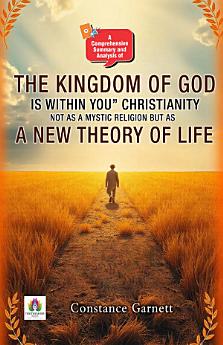A Comprehensive Summary and Analysis of The Kingdom of God is Within You” Christianity Not as a Mystic Religion But as a New Theory of Life: Demanding Ebook Book
About this ebook
Tolstoy critiques the hypocrisy of Christian institutions that justify violence, war, and coercion under the guise of faith. He asserts that Christ’s teachings on turning the other cheek, loving one’s enemies, and rejecting worldly power form the foundation of authentic Christian living. Tolstoy calls for a radical shift in human consciousness—rejecting violence, state control, and military service—and embracing a life governed by compassion, humility, and spiritual truth.
The book had a significant influence on prominent figures like Mahatma Gandhi, who cited Tolstoy’s philosophy of nonviolence as a major inspiration for his own approach to peaceful resistance. Tolstoy’s message remains deeply relevant, challenging readers to reconsider the true meaning of faith and moral integrity in a world driven by power and conflict.
About the author
Leo Tolstoy (1828–1910) was a Russian author and moral philosopher, best known for his epic novels War and Peace (1869) and Anna Karenina (1877). Later in life, Tolstoy experienced a profound spiritual transformation, leading him to embrace Christian anarchism and pacifism. His works on faith, nonviolence, and social justice—including The Kingdom of God Is Within You—influenced major figures like Mahatma Gandhi and Martin Luther King Jr. Tolstoy’s rejection of organized religion and state authority remains one of the most influential expressions of Christian ethics and moral philosophy.








